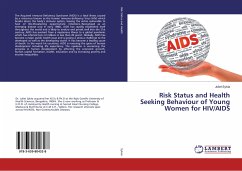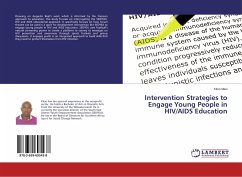
Risk Status and Health Seeking Behaviour of Young Women for HIV/AIDS
Versandkostenfrei!
Versandfertig in 6-10 Tagen
51,99 €
inkl. MwSt.

PAYBACK Punkte
26 °P sammeln!
The Acquired Immuno-Deficiency Syndrome (AIDS) is a fatal illness caused by a retrovirus known as the Human Immuno-deficiency Virus (HIV) which breaks down the body's immune system, leaving the victim vulnerable to host of life-threatening opportunistic infections. Recognized as an emerging disease only in early 1980s, AIDS has rapidly established itself throughout the world and is likely to endure and persist well into the 21st century. AIDS has evolved from a mysterious illness to a global pandemic which has infected tens of millions in less than 20 years1. Globally, AIDS has become a major ...
The Acquired Immuno-Deficiency Syndrome (AIDS) is a fatal illness caused by a retrovirus known as the Human Immuno-deficiency Virus (HIV) which breaks down the body's immune system, leaving the victim vulnerable to host of life-threatening opportunistic infections. Recognized as an emerging disease only in early 1980s, AIDS has rapidly established itself throughout the world and is likely to endure and persist well into the 21st century. AIDS has evolved from a mysterious illness to a global pandemic which has infected tens of millions in less than 20 years1. Globally, AIDS has become a major public health issue and is posing a serious challenge to the developed as well as the developing world. It has become a leading cause of death. In the worst hit countries, AIDS is reversing the gains of human development including life expectancy. The epidemic is worsening the progress in human development by affecting the economic growth, human capital formation, health, education and by increasing poverty and income inequalities.












